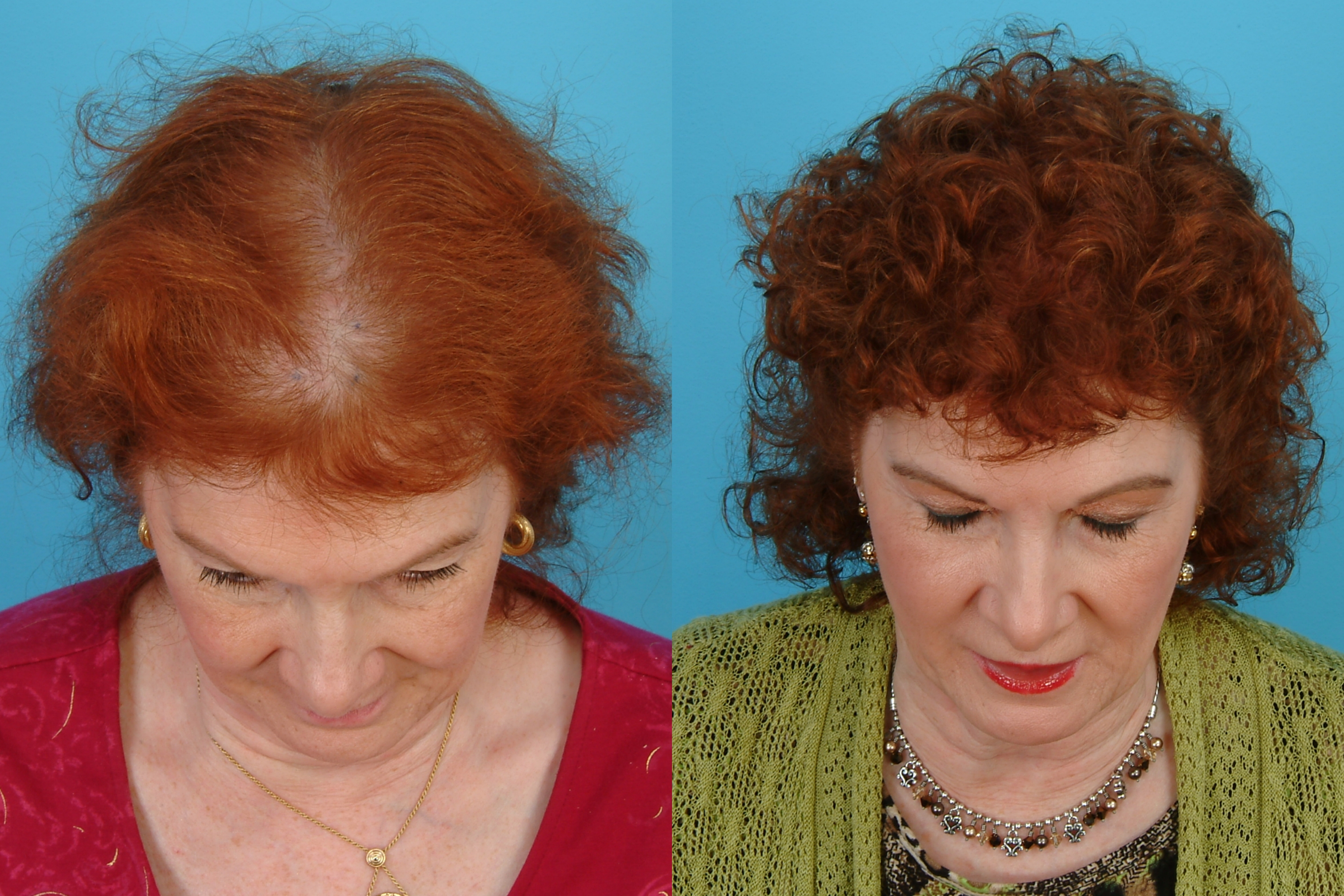Menopause Taboos:
Thinning Hair, Painful
Sex, and What You
Can Do to Stop Them
Hot flashes, mood swings, and trouble sleeping are symptoms of menopause that women openly discuss. But they are far more hesitant to talk about painful sex and hair loss, even though these conditions affect many millions of women.

September is Menopause Awareness Month, and Healthline sat down with two physicians to bring painful sex and thinning hair — two "forbidden" topics — into the spotlight.
Dr. Donnica Moore, an OB/GYN in Chester, New Jersey, told Healthline that vulva vaginal atrophy (VVA) is one of the most common yet least talked about symptoms of menopause.
“VVA is a condition that occurs over time, and about 50 percent of menopausal women will have significant discomfort as a result of VVA. The most common form of discomfort is dyspareunia, which is painful sex," explained Moore.
"Vaginal dryness is a result of VVA," Moore added. "This is the thinning and aging of the vaginal tissue as a result of changes due to menopause. Those changes are the decreased production of estrogen. Almost every tissue in a woman’s body responds to estrogen. When we go through menopause, the big news is we are not having periods anymore, but the reason is because we are not producing estrogen from our ovaries.”
Liberated Women of the 60s and 70s Don't Speak Up
Moore said women are embarrassed to mention to their doctors that sex is painful, in part, because they think they are the only ones experiencing this symptom. According to Moore, of the 65 million women in the United States who are now going through menopause, about half, or 32.5 million, are experiencing painful sex.
"We know that only about 24 percent of those women even talk to their doctor and get properly diagnosed. Of those women, only about 7 percent are being offered medical treatment. So there are an awful lot of women who have this condition, who haven’t had the conversation with their doctor, and have not received proper therapy," said Moore.
Women are mum on the subject with their friends, and even their sexual partners. "We have a don't ask, don't tell situation ... The irony is, baby boomer women are going through menopause at a rate of about 5,000 per day in the United States and Canada. This is the generation of women who came of age in the 1960s and talked about everything. This is the group of women who ushered in the sexual revolution, and now many of these same women are among the millions of women who are experiencing painful sex due to menopause, and nobody is talking about it,” said Moore.
"The irony is, baby boomer women are going through menopause at a rate of about 5,000 per day in the United States and Canada. This is the group of women who ushered in the sexual revolution, and now many of these same women ... are experiencing painful sex due to menopause, and nobody is talking about it.” — Dr. Donnica Moore
Although many women use lubricants to alleviate painful sex, Moore says lubricants “do not treat the cause. The cells of the lining of the walls of the vagina age like the cells on your face. The mucosal cells, the cells lining your vagina, go through very similar changes. A lubricant is like what a lotion would do on your face. A lotion is a very temporary solution, but it doesn't sink into the deeper layers of your skin like certain moisturizers ... It doesn't do anything to the cellular structure.”
New Pill Treats VVA Without Raising Breast Cancer Risk
Ospemifene (Osphena), a non-hormonal oral medication manufactured by Shionogi, was approved by the Food and Drug Administration in 2013 to treat VVA.
Moore said Osphena’s packaging warns that the drug may increase the risk for cancer of the lining of the uterus, called endometrial cancer. Other side effects include increased risk of stroke, blood clots, hot flashes, muscle spasms, vaginal discharge, and increased sweating.
“Those things are also side effects of menopause," Moore said. "Women have to talk to their doctor about what is right for them. That’s the same situation with estrogen or any other prescription medication. With a prescription medication we always weigh the risks and the benefits."
Moore said Osphena or supplemental estrogen can actually make the cells of the vagina healthier and more robust.
"I want to be very careful not to imply this can restore you to where you were when you were 25," Moore cautioned, "but it can help improve the functioning of your vaginal mucosa. Osphena and estrogen act the same way in that regard. Osphena acts like an estrogen in some tissues of the body, and not like an estrogen in other tissues of the body.”
Estrogens, a category of medicine that includes patches, cremes, and gels, can treat the underlying cause of VVA. However, there is concern about giving women supplemental estrogen because it has been linked to the growth of certain cancers.
"The cancer most women are most concerned about is breast cancer ... Anything that can possibly increase the risk of breast cancer, even slightly, is going to make women very appropriately nervous, and that is why most women won’t take estrogen. That is probably the biggest difference between estrogen and Osphena. Osphena is not an estrogen, it is not the hormone, and it does not increase the risk of breast cancer," said Moore.

Pictured left to right at a "Women Take Charge" event: Shionogi COO Deanne Melloy, Dr. Margaret Nachtigall, Ali Wentworth, Dr. Donnica Moore, Dr. Shannon Chavez. Photo courtesy of Michael Loccisano/Getty Images.
Shionogi has developed a campaign, dubbed "Women Take Charge," to raise awareness of women's sexual health.
Moore, who supports Shionogi in raising awareness, said, “We are challenging women to take the pledge to talk to their friends about painful intercourse. When I talk to my own friends about it, it opens up the floodgates of comments. Many of my friends are physicians, others are not physicians but are well-educated, and some have said, 'I thought this was how it was supposed to be' ... When you are having painful sex, your natural inclination is to say, maybe I don’t want to have sex that often,” said Moore.
Comedian Ali Wentworth told Healthline she has not experienced menopause yet. But when she read about painful sex as a symptom of menopause in a magazine, she decided to support Shionogi and spread the word that "we should have the conversation about it. There’s no reason people should be shy. I don’t like the idea that when I go through menopause, sex will be painful. I don’t want to feel like I've expired sexually.
"A lot of my friends are going through menopause. It seems so hush, about how you can get answers," Wentworth said. "It’s something women should be talking about. Some women are embarrassed and don’t want to discuss it with their doctor. You should talk to your doctor about it."
Why Do Women Lose Hair During Menopause?
Thinning hair and hair loss is another taboo subject for many menopausal women.
Dr. Alan J. Bauman, a board certified physician who specializes in hair restoration at his practice in Boca Raton, Florida, told Healthline that about 100 million women in the United States have thinning hair.
"Most women who come in to seek treatment for hair thinning do so around the time of perimenopause and menopause. The vast majority of hair loss is genetic; it’s female pattern hair loss," he said.
Hair loss occurs gradually, but most women don’t notice it until it reaches a certain point, meaning that they lose coverage in a particular area, or that their hairline has changed dramatically. When women do notice, it seems like their hair has thinned overnight.

A patient at Dr. Bauman's clinic before and after treatment for hair loss. Photo courtesy of Bauman Medical Group.
"You can lose 50 percent of your hair volume in a particular area before it starts looking noticeably thin," said Bauman.
There are very specific hormones regulating hair follicle growth cycles. When women are pregnant, more of the hair follicles are in a growing phase than normal. Women's hair grows thicker and more lustrous. After childbirth, their hormones return to normal, and the hair follicles shift back into a resting phase. Six to 12 weeks after they give birth they experience hair shedding.
Menopause hair loss happens more slowly, Bauman explained. "It’s not a huge shift where you see a massive shed," he said. "In menopause it's a gradual decrease in either the ratio of hormones or the amount of hormones in the body. We are talking about estrogen and progesterone and the ratios versus testosterone. When those levels change or diminish, that’s when the hair quality changes and diminishes as well."
Bauman said hair loss may include changes in the hair line, part line, and less coverage of the scalp in these areas. "Sometimes women are already modifying the color, curl, and hairstyle to accommodate those changes. It can be very stressful and very devastating to their self-confidence and sense of well-being," Bauman said. "Very often, the vast majority of patients don’t really have issues with their blood work, and don’t really have medical problems. Hair loss is a heredity thing that happens at a particular age, and usually with menopause you’ll see it happening the most."
A Hair Transplant Patient Tells Her Story
For early stage hair loss, noninvasive treatments include platelet rich plasma (PRP), topical minoxidil (Formula 82M), and low-level laser light therapy. “Laser is painless, the least expensive treatment over time, and it can be done at home." said Bauman.
Hair grows by about half an inch a month, and changes can be measured in 90 days. "We measure the different areas of the scalp to see which areas are responding. If they are not responding, we can modify the treatment regimen to accommodate for that," said Bauman.
However, "If you have a density problem, meaning the numbers of hairs have been depleted, we need to do some degree of transplantation," he added.
Andrea W., one of Dr. Bauman's patients, was willing to share her story about receiving a hair transplant, but asked that her last name not be published.
"My hair was thinning in the front, and it had me feeling like I had to keep finding a new hair style to camouflage it. I knew it was going to get worse. I had a hair transplant ... Now I can wear my hair any way I want. It looks fantastic." — Andrea W.
Andrea told Healthline, "My hair was thinning in the front, and it had me feeling like I had to keep finding a new hair style to camouflage it. I knew it was going to get worse. I had a hair transplant. It was one session that lasted a good full day.
"Overall, my entire head of hair has strengthened and thickened, and I am very happy. I was past menopause. My hair was thinning over time. I didn't feel good," she said. "Now I can wear my hair any way I want. It looks fantastic. Nothing is as comfortable as natural teeth and natural hair."
Thumbnail photo courtesy of Michael Loccisano/Getty Images.
